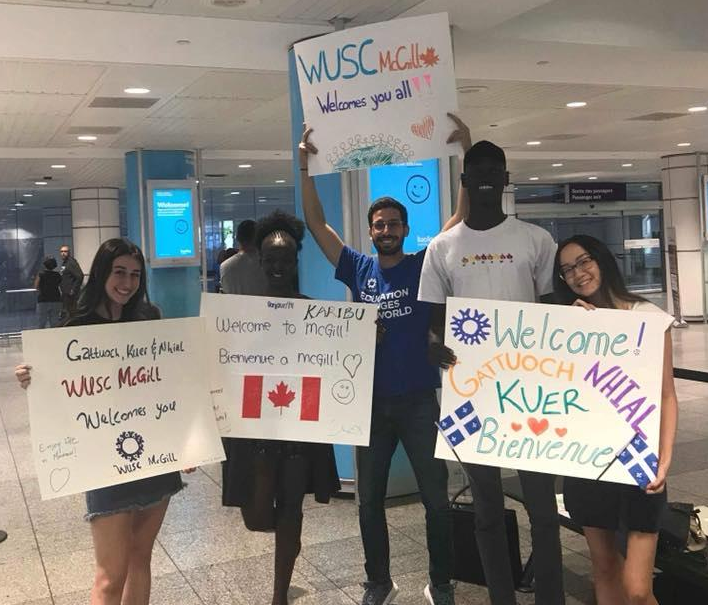In December, three student refugees—from Uganda, Lebanon, and the Kakuma Refugee Camp in Kenya—will arrive at McGill and start their studies. These students are part of the Student Refugees Program (SRP) within the World Universities Service of Canada (WUSC). According to their mission statement on their website, WUSC is a non-profit organization that is committed to creating a better world for all young people, and amongst that does so by improving access to higher education for refugees in low-income countries.
SRP scholars are educated, tested, and selected by WUSC, with help from the United Nations High Commission for Refugees (UNHCR) with the support of various local non-profit groups. Together with more than 95 other campuses across Canada, the WUSC McGill local committee comes into play after the students have already been selected.
Students in this program that arrive at McGill have come from a variety of countries, including Syria, South Sudan, Rwanda, Burundi, etc. WUSC resettles the students from countries of asylum in Lebanon, Jordan, Malawi, Kenya and Uganda.
WUSC’s SRP is a refugee sponsorship program which has a local committee branch at McGill. Within McGill, WUSC members ensure that the incoming students have all they need to settle at McGill, and in Canada, to start a new chapter of their lives.
However, with the COVID-19 pandemic, integration is going to be harder than in previous years. Alice V. Ishimwe, part of the executive team as a U2 Social Work student part of WUSC McGill local committee, has explained that students’ arrival in Canada has been delayed due to the pandemic.
“Usually, the SRP students arrive in the last week of August to start their school year in the Fall,” said Ishimwe. “But travel restrictions due to the pandemic and border closures overseas affected their arrival: they had to add an additional four months to their almost two years wait to get into Canada.”
The pandemic has not only delayed their arrival but also made it harder for WUSC to support them.
“Orientation is going to be challenging as they have to learn everything from scratch. By everything I mean, getting used to new home equipment, Canadian money to purchase things, let alone experiencing winter for the very first time,” explained Ishimwe.
Arriving students in December will not only have to adapt to life in Canada, its harsh winters, and the intensity of McGill academic life, but they will also have to adapt to remote learning due to COVID-19, as online learning is set to continue through the winter semester at McGill as well.
“They’ve never done online learning before, so this is going to be a huge adjustment period for them. Some of them have to learn how to use a personal computer for the first time,” said Ishimwe. “We’re looking into videos they can watch; we will be rotating the check-in schedule to ensure they’re learning how to use equipment in their small residence rooms during their 14-day quarantine. We’re also looking into food delivery, phone plans, basic needs shopping, opening bank accounts, etc.”
This WUSC team also noted frustration with the incoming SRP scholars not being able to arrive for the Fall 2020 semester as expected, as well as additional adjustments that must be made due to pandemic restrictions.
“We were very disappointed by the arrivals being pushed,” said Ishimwe. “But we also realize how tough it was going to be to welcome new SRP students while we are also getting acquainted with remote learning ourselves. One of the best [parts of] past experiences was to welcome students at the airport with signs and cheer wearing our WUSC ‘Education Changes The World’ t-shirts. Now, we have to adjust this to one person picking them up while practising social distancing – it’s going to be tough.”
The Bull & Bear also sat down with Kuer Bul Gak, a third year student in bioresource engineering at McGill University on the MacDonald Campus and an SRP scholar. He noted that just two years ago, as a teacher at Kakuma Refugee Camp in Kenya, he had little opportunity to pursue tertiary education until WUSC offered him resettlement and a sponsorship at McGill. “I was thrilled, rejuvenated, and grateful.”
He noted that the youth-youth sponsorship model of WUSC and its investment in education, economic opportunities, and empowerment, provides “quality and durable solutions for young refugees.”
Despite the incredible opportunity WUSC provides for these students, members of WUSC McGill believe that the university could do more for student refugees.
“The funds we get to raise through the SSMU levy covers just the minimal needs the scholars have and that’s just for one year. McGill could help by waiving tuition and residence fees for the SRP scholars, for example, so we could lobby for more support for them and for an extended time,” said Ishimwe.
While the WUSC fee has been steady at two dollars per semester since 2016, tuition and residence costs have increased substantially during this time, and club members worry that WUSC will cease to be sustainable in the near future without a fee increase. The club is seeking to increase the fee in the winter 2021 SSMU referendum period. A fee increase would also help keep McGill’s WUSC club on par with the many other Canadian universities, including McMaster, UBC, and Bishop’s, which host many more students than McGill. Many universities also reduce WUSC students’ tuition and waive cafeteria or residence fees. While McGill classifies SRP scholars as Canadian rather than international students for tuition purposes, the International Students Office administration has chosen not to assist scholars as extensively as many other Canadian universities do.
Few students make it through the SRP compared to the number of refugee students who finish high school. While the WUSC office received over 600 applicants in Malawi for this incoming cohort for example, only eleven are coming to Canada this winter, according to Ishimwe.
Despite this year’s difficulties, students will be quarantining in residence halls and will receive a welcome package as well as a designated guide who will help them navigate campus and Montreal. They will also have access to online activities to meet people. Normally, WUSC hosts a holiday meal for the students and greets them at the airport when they arrive.
Although the circumstances of their arrival will be very different from previous years, WUSC McGill asserts their commitment to the program, and their happiness on welcoming the refugees this year.
“It is not going to be an arrival like the others, we are constantly planning and brainstorming to adapt to the situation, but despite all of this, we are very excited to finally welcome the long awaited SRP scholars to McGill,” confirmed Ishimwe.


